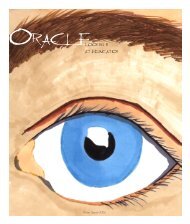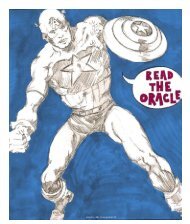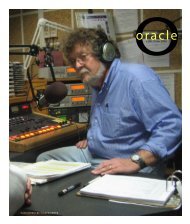March 2009 - Lincoln East High School
March 2009 - Lincoln East High School
March 2009 - Lincoln East High School
- No tags were found...
You also want an ePaper? Increase the reach of your titles
YUMPU automatically turns print PDFs into web optimized ePapers that Google loves.
Student ArtworkPhoto submitted by Candace MarolfPhoto submitted by Candace MarolfPhoto submitted by Laura RasmussenPhoto submitted
Table of ContentsA&EFocusTrue Spartan Survivors:Inspirational accounts oftrials and triumph.tEBand rallies foranother Expressionsshow.Plus: Scavenger huntsends students onphoto rampage.VoicesParents handingthe reigns over toschools?Plus: A crisis forcompassion.NewsHow will the Stimulus Packageimpact Nebraska?Plus: Illegal immigrants and collegefunding.“I’d rather not die, thanks.”"By killing killers, we teachthat killing is wrong.”As a connoisseur of brains,I love a hint of poison and adash of poetic justice.”Sports“Keep them coming! I getpaid for every soul I reapand, with this economy, Ineed a steady income.”r -Death-Ro, Joe -Mall Cop, Moe -Zombie, Zoe -Grim Reaper, BobSparatans show their spirit at the StateTournament.Plus: An inside look at <strong>East</strong>’s SpecialFacesSpartans create culinarymasterpieces!News.........................................4-5Voices........................................6-7Faces..........................................8-11Focus.........................................12-15A&E...........................................16-19Sports........................................20-21
Staff EditorialThe parent trapThese days it seems that high school is like Kindercare for teens. Everymorning, parents pull up to the school, park illegally and drop off their preciouslumpkins for a full day of food, fun and learning. But the “fun” doesn’t seem to endthere. Many parents seem to forget that, after picking up their kids at the end ofthe day, it’s their job to take over raising their kids. Even the parent of a 3 yearold knows this.Recently, an <strong>East</strong> parent dropped off some Facebook photos on an administrator’sdesk. In one of the photos, <strong>East</strong> students were shown holding alcoholicbeverages. Apparently, the parent thought it was the administration’s job, nottheirs, to do something about the content of this photo. Based on the contents ofthis photo, the administration was put into a corner and suspended some of thestudents in the photo.Yes, underaged drinkers can get be M.I.P.ed simply based upon the contentsof a photo. But why did the parent choose to make the school do something,rather than take care of the matter himself?<strong>School</strong>s are in a no-win situation here. They get in trouble for not doingenough. They get in trouble for getting too involved. They get in trouble for doingtheir jobs. Or for doing parents’ jobs. This parent forced the school to take actioneven though the school had not sought out the Facebook photos in the first place.What’s the message here, then? It’s that parents need to stop outsourcingtheir parenting. For some parents, they get so overwhelmed by the job of parentingthat they ask someone else to do it for them and then turn around and blamethat person for the problem itself.Every day, school expects students to be responsible. Every day, studentsmust attend class, take tests, produce homework, follow the rules and park legally.All of these responsibilities can overwhelm a student, yet the expectations stillexist. So why should we expect less of an adult? Maybe there should be StateStandards tests for parents. Maybe parents should have to pass a GraduationDemonstration Exam in order to be parents. Or maybe they can just starting toaccept responsibility for their lives and the lives they created. Is that asking somuch?The keys to a fruitful lifeSara Hinds ReporterWhen my friend said, “When lifehands you lemons, make orange juice. Itconfuses people,” I didn’t get the joke.That was because I didn’t know the originalphrase, “When life hands you lemons,make lemonade.” But now, after mymom has told it to me multiple times, I tryto follow that philosophy in my life. Basicallyit means you can either pout and begrumpy or you can make the best of thesituation.This past yearwhen I didn’t makea sports team, Iwas crushed. But,after going throughthe very successfuland undefeated season with my newteam, I realized that there was a brightside to not making the other team. I hadmore fun playing on the team that I didn’twant to be on at first than I would’vehad on the team that I originally wantedto be on.When you go through hard times,good times will be coming around thecorner; so be positive and don’t worry. Ialso believe in other things my parentsand grandparents told me like “have fun,”BELIEFstatementand “play with your heart.” These thingsnot only apply to sports, but to my life aswell.Watching sports, as well as playingthem, also taught me some things in whichI believe. First, like a true Nebraskan, Ibelieve in Husker football. No matterwho the opponent, no matter what theprojected score, I believe they will win.After following the past few footballseasons and hearingwhat otherpeople have to sayabout the topic,I have come tobelieve that howyou play is a resultof how much work you have put in, howyour attitude is, and how much heart youhave. I believe that effort, heart, hardwork, and dedication mean just as muchor even more than ability. And that notonly applies to sports, but also to life.Work hard at everything you do,and it will pay off sooner or later. But,don’t just go through the motions. Playwith passion. Listen to your heart andfollow your heart. And when life handsyou lemons, definitely make lemonade.Someone isSpeaking OutWhat do youthink about thedeath penalty?6 VOICES“I’d rather not die, thanks.”"By killing killers, we teachthat killing is wrong.”As a connoisseur of brains,I love a hint of poison and adash of poetic justice.”“Keep them coming! I getpaid for every soul I reapand, with this economy, Ineed a steady income.”By Sarah Weber -Death-Ro, Joe -Mall Cop, Moe -Zombie, Zoe -Grim Reaper, Bob
We should demilitarize <strong>East</strong> <strong>High</strong>As professions go, the military isexplicitly dangerous. Members of themilitary could be killed, maimed or sufferpsychological damage. This cannot bedenied. And yet, they sell their product,with many adverse effects in schools.Every time I see a recruiter at schoolI ask them their opinion on torture. Theyinvariably say that it is a useful toolfor the military and it ought not to bedisallowed. This is deeply troubling tome. Torture is, after all, a crime againsthumanity. Why are people allowedto advocate something that is clearlyillegal? And in schools, even. Becausethe military is completely immune fromcriticism.Why would a school let a personadvocate for a crime? If a representativefrom an environmental groupadvocated the destruction of loggingequipment, they would be booted offcampus instantly. In Alaska, a studentwho displayed a poster reading “bonghits for Jesus” at a school-sponsoredevent was suspended. The case went allthe way to the Supreme Court, wherethe court ultimately sidedwith the administration. I haveheard two recruiters, onefrom the Army and one fromthe Marine Corps declaretheir support for torture in thecase of “illegal combatants,”despite being a crime. TheUnited States signed andratified the United NationsConvention Against Torture.Contrary to what thesetwo recruiters may think theUnited States is officially and concretelyagainst torture. That they have a tableat school is simply unfair. The recruitersare advocating a crime that is violentand barbarous. If this country still hadTom BolinVoices Editorthe draft, conscientious objection wouldbe a crime. I would bet you $1 million ifsomeone came to school to advocate foravoiding conscription they wouldn’t be letback in schools. America is amacho nation and, because ofthat, physically defending thenation is valued more thandefending the principles ofthe nation nonviolently.“War will exist until thedistant day when the conscientiousobjector enjoys thesame reputation and prestigeas the warrior does today.”John Kennedy said that in aletter to a navy friend.I am all for a deferential attitudetowards veterans. I support veterans’rights and the G.I. bill. I respect veteransand the military on a personal level butnot as an organization. The U.S. is builton checks and balances. It’s the reasonour government works. By puttingthe military beyond reproach, we’re settingourselves up for failure. The militarycan be wrong. We must accept that.The military as an organization is just likethe Justice Department or the CommerceDepartment, all of which need oversightto functionThe problem arises because, as anation, we conflate personal respecttowards an individual soldier or veteranwith the military as a whole. This lineof thinking leads us to situations like thequagmires in Iraq and Vietnam. “Supportthe troops” is euphemisms for “love yourcountry.” If you ask me, “supporting thetroops” would mean not deploying theminto dangerous situations. For the benefitof the military and everyone else let’sput the veteran, not the military, on thepedestal.Country faces a compassion crisisMy mother has been taunting me relentlesslyabout the excessive amount of time I’ve been spendingat school lately. Normally I’d disagree simply for thesake of argument, but this one time, I have to agree.Let’s face it: I’m a speech nerd. With State just aroundthe corner, I’ve allowed speech junk to monopolize mythoughts, which can be perilous for a journalist, but Ithought I’d bite the bullet and share my speech subjectwith you this month.My topic this year is compassion, or rather thelack thereof, in contemporary society- a relevant issueamong adults and teens alike. With so many charitiesvying for our attention and sincerity around the clock,it’s no wonder we’ve become immune to images thatshould bother us. Take the thousands of starving childrenin Africa, for instance. Cross their terrifying trauma withcommercialization and we’re left with a viewing populationof robots who can spot a charity seeking moneyfrom a mile away.Two years ago, the Dalai Lama toured highschools preaching one powerful, pervasive messagefor teens: lack of compassion is a disease.“We are becoming more and more detached,seeing this as achronic disease.That mustchange,” thespiritual leaderdeclared. Headdressed theconcept ofself-exoneration,which is an under-recognizedcharacteristicof many teens.When we’re notanxiously await-ing the nextmeaningless Kiersten Haugen text messageor compulsively Editor in Chief checking ourFacebooks,we’re seekingout yet another source of gratification.He argued that while we aim to pleaseourselves, our intentions must not be dispassionate oregoistic. For many of us, the assumption that major crisesdon’t affect us is enough to keep us from donating ourspare change or even our time.The economy is certainly a factor in the recentlack of charitable giving, and as teenagers, we makethe most of our part-time fast-food gigs with just enoughto cover the cost of gas and the latest theatre flick.We’d do well, however, to remember that donatedtime is a renewable resource. Try converting an hourof entertainment into an hour of service for someone inneed. Chances are, you’ll end up enjoying giving timebecause, well, happiness is as contagious as the strepvirus running around <strong>East</strong>.If we can convert some of our dispassionategreed into selfless giving, I think the Dalai Lama wouldbe proud. Compassion affects all of us, whether you’remaking a donation or giving a speech… which remindsme, the clock is still ticking. Wish me luck this week!VOICES 7
Pet ProjectsMan’s best friend has always been a vitalpart of our lives. We depend on animals to liftour spirits and to love us unconditionally. Why isit that we give so much of ourselves to our animals?Perhaps because, unlike humans, animalsnever lie, and undoubtedly love us. Yet peoplesome times tend to take their animal obsessionsto the extreme. Beyond Hollywood’s obsessionwith live, little dogs (as opposed to dead, littlefoxes) as the hottest accessory for celebritiessuch as Paris Hilton and others interested inhaute couture. Unfortunately for these prissygirls, animals have needs. The real dog-loversare the ones who realize the responsibility aswell as the fun that goes along with owning apet. Many seemingly obsessive pet owners canbe found here at <strong>East</strong>, such as Mike Foley.<strong>East</strong> junior, Mike Foley and his dog Woofyare pretty much inseparable. Woofy is a BichonFrise, which Foley says, “is kind of like a poodle,but less fluffy and less evil, of course.”Many factors separate Foley from theaverage petowner.Theseinclude brushingWoofy’steeth wheneverpossible(“Woof hassevere dentalproblems”)and groomingand bathinghim by himself.Whether itbe obsessiveor not, Foleyand Woofyalso frequently8 FACESengage in meaningful conversation, and theFoley household can be heard down the blockbecause of Woofy’s sleep-talking and sleepwalking.Not only is Foley a loyal caretaker, but alsoa hilarious best friend that plays the occasionalprank on Woofy.“You know how dogs respond to wordslike walk and cookie? Well, I decided my dogshould be different. So instead of training himthat ‘treat’ means ‘treat’, I trained him so that‘toaster’ means ‘treat’. So whenever anyonesays, ‘The toaster popped!’ he freaks out,” Foleyrecalled.Woofy wasn’t the first dog to spark Foley’slove of dogs, though. Biscuit is also in the picture.“Biscuit is the same breed of cunning canine,a few years older though. We had her on ourroad trip in Newfoundland, and we took afamily picture at my old elementary school. Weput her on top of a ledge to sniff around. WeNotice any similarities? Mike Foley and his dog, Woofy. Photos by Laura Rudeen.Ingrid Holmquist Reportergot in a conversation with some people, finishedthe conversation, and left. We didn’t realize wehad left her on top of the wall until half an hourlater. She was just sitting there, taking a nap.”The underlying question for many peopleis how do we get so attached to dogs? Forcenturies, dogs have been a very importantpart of our culture spanning all the way back toEgyptian times.Foley says, “Dogs are the ultimate bestfriend. They’re super loyal, always ready andwilling to listen, play, cuddle, or just be withyou.” Said Foley “Even if you offend or hurtthem, they immediately forgive you, and wantnothing more than to be with you. And that’sreally comforting.”Dogs contribute immensely to our society byserving as companions to the disabled, servingas ears and eyes, aiding soldiers in war, andassisting in drug patrol and drug confiscation.But most of all these canines provide love anda faithful relationship to all people in ownershipof a dog. Dogs don’t discriminate. They forgiveyou everytime, and formost peoplethey’re theonly form oflove that runswagging andkissing wheneverthey seeyou enter theroom. If that’snot a confidenceboost,then you’retoo tough toplease.
Jim Elsener and ScoutNavina DeLight Focus EditorThe most enduringand beneficial relationshipmany peoplehave is the one withman’s best friend,his dog. This idea isexemplified in ourown school with JimElsener and his dog,Scout. The two havebeen pals for thepast six years, sinceElsener first purchasedher from a breeder.At first the breederseemed unsure ofElsener and told himthat he would beunable to sell Scoutto him. Undeterred,Elsener returned witha debit card and thefriendship soon began.Elsener knew thathe wanted a goldenretriever becausethey come from hunting lines and areknown to be easy to train. WhenScout was around eight or nineweeks old, Elsener recalls that she had“a real mean streak,” and he wentthrough the basics of training her notto bite by giving her a bone and thentaking it away.Out of his three dogs, Scout isElsener’s considers herself human, andis not too fond of other dogs.“She’s kind of snooty. She wonderswhy we got other dogs,” saidElsener.Elsener is happy that the kids inschool are so good with her.“We spend a lot of time together.It’s fun to have a dog that you cantake without a leash,” said Elsener.When asked to describe Scout,Wherever Jim Elsner goes, Scout is sure to be right behind. Photoby Laura Rudeen.Elsener said that she’s always worried.She’s the type of pet that needsto stay busy (if not, she bites herself),and she’s always thinking of what sheis supposed to do. Scout is so quietthat Elsener can even take her deerhunting with him at his cabin by thePlatte River.“She’s very intuitive. She can reademotions,” said Elsener. This ability hascarried across into her training, andshe and Elsener read to children andvisit retirement homes.What’s in the future for the pair?Elsener hopes that it will be a long lifeand retirement together.“When I was younger I said thatI would have a cabin on the PlatteRiver and ten dogs. I have the cabinbut only three dogs, so I’m close.”Mary Butler and WillyAmsley Senkbeil ReporterFor a numbers person, it takesMath teacher Mary Butler a while torecall all her pets.“Oh my goodness, I have had somany pets in my life, ranging from aparakeet named Toodles to a lambnamed Coki,” said Butler.At this moment, the only petsthat Butler has are her adored Cairnterrier, Willy, and her class’s pet betafish. She has had Willy since February2001 and still enjoys spoilingher baby. Willy is just the cutest littlepuppy who is always up to no good.She said that Willy is so special in hisown way and he is the only pet thatshe has owned that she has spoiled toeternity.“I spoil Willy non-stop and heknows it but that shows that I lovehim even more,” said Butler.Is it all too much? Not for Butler.Quite simply, she loves Willy to a “T!”Beyond your typical pet lover, withButler and Willy everything is magnified100 percent. Sometimes it evenseems as though Willy himself is theboss. He knows what he wants, and ifit’s not given to him, he demands it. Alittle strange for a dog? Not at all!“Am I obsessed? No. But do Ispoil Willy non-stop, which makes himthink he’s the boss? Yes,” said Butler.We all say that we look like ourpets. Is this true? Take a picture ofMs. Butler and put it next to a pictureof her adorable dog, Willy, and whatdo you see? Do they look a tinybit similar? To some of us not at all.People and dogs look nothing alike!Yet, some of us look closer and seethat similarities do come up betweenpets and their owners and surprisingly,Ms. Butler and Willy do havecute similarities. It’s a face you’ll neverforget!Ms. Butler’s dog, Willy, posing for a photo. (Photo courtesy of Ms. Butler.)Ms. Butler’s dog, Willy, poses for a photo. (Photo courtesy of Ms. Butler.)FACES 9
Winston Beans:Surviving a SummerFresh out of the ovenAmsley Senkbeil ReporterPeggy Merrill ReporterEndurance tests can range from emotional challengesto physical perseverance. Generally these“real life” periods of hardship last a few days atthe most, while tests that take weeks or moths areoften the theme of reality TV.For senior Winston Beans, his test for endurancelasted more than a few days and was certainly nota TV show. Beans lived in the wilderness of Montanafor seven weeks this past summer, not onceventuring from the mountain camp.“I didn’t even know I was going.” Beans admitted.“They took me in handcuffs and a blindfold. Irealized early on I couldn’t leave.”The camp is used as a correctional center, designedto train teens to live for themselves and togain strength in enduring abilities. Attendants of thecamp are sent because of behavioral issues, withthe knowledge that the camp’s ethic helps developa healthier attitude in teens.The daily expectations were no easy task,especially without modern conveniences. Still, Beanssaid campers came away from the experiencewith a different view of life and a better sense ofcharacter.“I knew it would make me a better person,”Beans said. “I knew it would make me better in thefuture.”Once his time at camp was completed, Beansreturned to Nebraska. He is a member of thebasketball team and is going out for soccer in thespring. Thanks to his camp experience, Beans nowenjoys cooking, preparing foods over a fire pit(roasting marshmallows is his favorite), and readingfor relaxation.With the encouragement of his family, Beans isvery open about his experience at the camp andhow his life has changed since then.For Beans, the lesson learned was:“You can’t always control everything thathappens in your life, but you can control how youreact,” he said.10 FACESPicture this: a young boy stays up late all summerlong, watches the Food Network channel, sleepstil noon and then works with the foods he learnedabout the previous night. May not sound like a greatsummer to some, but for freshmen Tanner O’Dell, itwas a blast!“I used to stay up really late each summer nightand just sit and watch the Food Network channel.When I woke up the next morning I would experimentwith different recipes all day; a little geeky, I know,but it was fun,” said O’Dell.O’Dell only started cooking about two yearsago, which is surprising considering all of the accomplishmentsthat he has achieved. O’Dell recentlycompeted in the LPS cooking competition, and wonfirst place in his division. He was awarded the “TopChef Award.” He is also getting anxious for State,which is coming up on <strong>March</strong> 28.“I never thought cooking would ever take me thisfar. I just thought it was a new and exciting thing totry,” said O’Dell.O’Dell’s parents have been behind him 110percent with his cooking extravaganza. They havePictured: Tanner O’Dell (left) and some tasty creations.Photos by Eric Luebke.paid for everything; which is an added bonus forO’Dell. O’Dell’s parents also act very responsibly ashis “agents”“Because I’m a minor, I am not allowed to talk toany of the producers that call so my parents are theones that take care of that kind of stuff,” said O’Dell.Now what we’ve been dying to hear about isthis rumor of O’Dell being asked to perform on theshow “Regis and Kelly” in late April. So is this true,is Tanner really going to be able to perform on…REGIS AND KELLY? Excitingly enough, the rumor hasbeen confirmed! O’Dell received a call from one ofthe producers a few weeks ago and he was askedif he would be interested in performing on “Regis andKelly” for a show premiering in April. This show hasnot been confirmed quite yet, but the opportunity stillstands and hopefully the O’Dell family will be hearingback from these producers soon.So, what food describes O’Dell the best?“Chili is spicy, it leaves a definite mark and it’sabsolutely delicious,” said O’Dell.Right now we couldn’t agree more-O’Dell is onFIRE!
Saying “Bonjour” to ScienceSam Karas ReporterMr. Schmidt doesn’t get nervousoften.Known for his interactive AdvancedChemistry and Physical Science classes,<strong>East</strong> science teacher Marcus Schmidt hasseen it all. But in the <strong>2009</strong> NebraskaRegional Science Bowl finals, he was losingfingernails by the second.“I’d never seen him so stressed,” saidThomas Marin, a guest teacher fromPoitiers, France.Despite coaching Science Bowl, ScienceOlympiad, and girl’s tennis, competitiondoesn’t come naturally to Schmidt.“I was never very competitive,” heconfessed. “But I love watching studentscompete, especially in science. They’reputting all these ideas and theoriesEveryone Has A StoryLucas Hines: Slam PoetKiersten Haugen Editor in ChiefIf you’re a fan of <strong>East</strong> basketball, then you’re probablymore than familiar with the “roller coaster guy.”Dressed in crazy Spartan garb, his face is caked inblue and white paint, he leads the crowd through theswaying cheer. The fans adore junior Lucas Hines, or“Bama,” but few recognize his true passion and talent:slam poetry.“Slam is just exciting,” said Hines. “I enjoy performingand getting reactions from people, whether it’s laughing,or just making them realize something important.”Hines earned the nickname “Bama,” after makingthe move from northern Alabama to <strong>East</strong> <strong>High</strong> only ayear ago. Hines developed an appreciation for language,especially poetry, at an early age. His love ofperformance drew him to the art of slam poetry.“Sarah Thomas gave me the opportunity to performat <strong>East</strong>,” said Hines of his English teacher. “She helpedme with creativity through language.”Creativity is certainly the name of the game whenit comes to Hines’ poems. He draws inspiration fromobservations, whether they are humorous, cynical, orhumiliating. He said the purpose of his poetry is to tella story while emphasizing the problems or humor ofeveryday life.From poetry festivals to our very own SNATRAPS,Hines has taken seized every opportunity to perform.together and making them come alive.”That’s a large part of his teachingstrategy, especially with advancedstudents—taking large, nebulous conceptsand bringing them down to a level thatstudents can manipulate and interactwith. Though it’s a dynamic strategy thatmany students enjoy, Schmidt wasn’talways planning to become a scienceteacher. “I did student teaching in college…andthen, I wasn’t too sure.”For Marin, who both observes andassists Schmidt in class, teaching wasalways a priority.“It was my first idea to be ateacher,” he said. And ultimately, thelinear education provided in Franceallowed him to keep his focus. Studentsare divided into classes, who stay witheach other for most of their secondaryeducation, and instead of splitting up forclass, the curriculum is pre-decided andthe teachers come to them.“In France, education is not about thesocializing,” he said. Instead, students turnto outside sports and activities clubs forthe boost they need. And that, he professed,was where he got his competitiveedge—especially in cycling. This rush fueledhis interest in concrete subjects, suchas math, physics, and chemistry. “It’s notjust about being right or wrong, but alsoasking, ‘Why?’ ”Though Schmidt, too, enjoyed sports,he found his passion for science in theusual lunchroom politics.Preparation for a slam performance,however, is no easy task. Hines usuallyworks with a piece for several weeksbefore presenting it.“You have to think about thecrowd,” said Hines. “You have to connectwith them. Sometimes I’ll use avideo tape or just speak into the mirrorto practice my delivery and decidewhich type of voice I want to use.”While Hines’ performances are certainlycrowd-pleasing, his ability to writeis equally awe-inspiring. Hines completeda book of original poetry last year, and isworking on a new book geared towardteachers which will be published throughUNL. The book contains strategies forteaching high school students complete with some ofHines’ poems and a video guide to slam poetry.How did he find the time? When Hines moved to<strong>Lincoln</strong>, he spent about three months on his own beforeschool began. During this time, Hines found the inspirationhe needed to write some powerful poetry.As for Hines’ crazy alter-ego, he contends that he isjust a major sports fan.“I’ve gone to a lot of college games and I always“Science geeks were the only kidswho would hang out with me,” he said.“And that was when things clicked.”Figuring out the hows and whys ofeveryday events became his focus,and teaching—eventually—became hisdream.Though Marin left for France in late<strong>March</strong>, both were excited about thecosmetic changes to <strong>East</strong> <strong>High</strong>—especiallygetting their parking spots back, andinstalling new fuel hoods in the sciencedepartment.As for the Science Bowl? They lostto Northeast <strong>High</strong> with seconds to spare.But competition, like any good scienceexperiment, deserves a second trial.Photos by Laura Rudeenlove the crazy cheers they do,” said Hines. “I just thoughI’d spice up the student section a bit. The roller coasterwas just an experiment, but it caught on really well.”Since joining <strong>East</strong>, Hines has certainly found his voiceboth behind the microphone and in front of the roaringfans. Hines’ future as a writer is definitely promising, andfor those avid ‘Bama’ fans, it looks as though the rollercoaster is gonna keep on rollin’.FACES 11
The Steinerfamily (Photoscourtesy of MickSteiner)A Survivor’s StoryMaesen Churchill Faces EditorAt some point, every person must copewith hardship. Whether it’s a period of financialstrain, being diagnosed with a disease, orcoping with the death of a loved one, tragedyseems to be all around us. But from hardtimes come uplifting and empowering storiesof making it through. Sometimes the mostinspirational stories deal with the simplestof human instincts: survival. The Oracle chose“Survivors” for its <strong>March</strong> Focus in the midst ofan isolation-prone period of economic recessionwhen sometimes all one can do is just that –survive.12 FOCUSFor junior Mick Steiner, survival means twothings. One is coping with his father’s death. Theother: dealing with various health problems thathave affectedhim since then.Steiner’shardship beganwhen hewas in middleschool. Hisfather, Timothy, was diagnosed with pancreatitisand various kidney problems. When he came infor bladder work, doctors found cancer. Still, theSteiner family had high hopes as Tim prepared fora procedure that aimed to remove the disease.Following the surgery, however, the cancercontinued to spread. It eventually got to thepoint where even a simple procedure to combatit would be impossible.“That was the first thing that scared me,” saidSteiner.After that, treatment“I never really got into my mind plans included chemotherapythat slowed thethat he might die until he did.” cancer’s growth. Steinerrecalls health problemswith his father continued,however. As his ability to fight off sicknesswaned, Tim would have colds that lasted formonths on end.During the summer of 2006, the diseasebegan to progress very quickly. Mick recallsgoing to basketball camp, and returning to findhis father in home hospice. The suddenness of the
situation made it difficult for Mick to cope.“I never really got into my mind thathe might die until he did,” said Steiner. Thelack of preparation was also difficult for hismother, Mary Steiner.“We always had a focus on the treatment,what to do next, how to keep going…you don’t really prepare yo urself [for thepossibility of death],” she said.Since then, Mary has had toadjust to a life without a father figurein her household. “It’s been different,”she said, acknowledging that thedeath has put a strain on the close-knitfamily.“We were used to a life with bothparents and kids,” said Mary. “It’shard [to adjust].”Mick and his 21 year-old-sisterCassie, a senior at Doane collegein Crete, have always had a closerelationship.“We talk to each other about a lotof things,” said Steiner.One thing that made dealing withthe situation particularly difficult wasthat his sister went off to school shortlyafter his father’s death. However,Steiner has maintained a solid relationshipwith his mother.“My mom works at home, so I seeher whenever I’m at home. We talk a lot[about my dad],” he said.Steiner also has found a support basein his friends. Junior Emily Ptacek has beenable to empathize with Steiner. Ptacekand Steiner have been in Sunday schooltogether from a very young age. Furthermore,Ptacek’s father, Bill, was diagnosedwith bladder cancer at around the sametime as Tim, and passed away late lastyear.Mary Steiner notes that the two teenswere able to support each other and“compare notes” through the difficult time inboth their lives.Support was something that Steinerhad to cling to the year following hisfather’s death. Throughout 2006 and2007, Steiner had a mix of problems that manifestedthemselves both physically and emotionally.“After he died, I was really physically sick…but it really transpired to be my mind trickingmyself to think I was sick,” Mick said.Mick’s health woes eventually developed intoa sleep disorder. Steiner describes his sleep patternsat the time to be coma-like – he could beshaken while sleeping and still not wake up.“It really made it tough because I was tired allthe time,” said Steiner. “It wasn’t unsolved issueswith my dad…I just hadn’t processed everything,”“Don’t think of yourself before everyoneelse. That’s just selfish.”he said.Steiner doesn’t like discussing the period of hislife with others, but he wants to do whatever hecan to ease the concerns of others.“I do want to answer the unanswered questionsfor people [who are concerned],” he said. “Iwant to explain the situation to people who gotthe wrong image.”Out of the tragedy of his situation,Mick has found an opportunityfor self-betterment as well. Hisfather’s death has him Steiner tograsp concepts that some peoplewill never fully understand.“It sounds cliché, but I definitelythink that it has taught me not tosweat the small stuff, and to appreciatethe small things in life,” saidMick.A positive attitude has helpedMick to remember the goodmemories about his father.“He was a good dad. He wasfunny, and good with kids,” saidMick’s mom.“There are certain contexts thatI remember him,” said Mick. Manyof his favorite memories of hisfather’s fun-loving personality areof carefree summer days.Both Mick and Mary Steinerrecall fun times with their familyat their cottage on Lake Okaboji.There, the family had a number offun summers with Mick’s dad.“I remember him a lot at thelake,” said Steiner.Steiner’s tendency to make hisfriends laugh is no doubt inheritedfrom his father.“He put others before him…hehelped everyone have fun. If otherpeople were having a good time,then he was having a good time,”Mick said about his father. Anyof his friends can tell you that thedescription fits Mick as well.From his father’s giving spirit,Mick recalls an overarching lessonthat his father taught him.“Don’t think of yourself beforeeveryone else. That’s just selfish,” saidSteiner.FOCUS 13
A sobering experienceIngrid Holmquist ReporterDrew Barrymore, Britney Spears, Mel Gibson,Lindsey Lohan, all of these names come to our attentionas survivors of the very destructing disease called alcoholismand substance abuse. Though while we read thelatest tabloids about the recently confirmed alcoholicsand what they’re doing to stop, I can see the disease inaction and a survivor through a much closer lens. All ofthese examples seem less than real in our lives becausethese survivors that we read about in the tabloids areNOT your next-door neighbor, your sister, your parent.My father, on the other hand, is a very real-life survivorand inspiration of hope and change to me.It astounds me how someone can turn their lifearound so drastically. Change is something that Ibelieve in wholeheartedly. I grew up in a home where‘change’ IS truly possible. My dad would drink until hewas no longer my father.“Humans generally don’t change because theywant to, but because they have to,” said Don Holmquist,my dad. It got to the point where he wasfinancially bankrupt, socially bankrupt, spirituallybankrupt, and emotionally bankrupt. This is howmy dad explained his ordeal with the disease ofalcoholism. It was looking up from the abyss thathe finally took treatment seriously. It would seemthat the survivor instinct had taken hold.My dad became a heavy drinker in hisadolescence. My dad and I are both largelypredisposed genetically to alcoholism with along line of alcoholics in our ancestry. He firstwent to treatment when he was 16, after gettingbusted with drugs. After that he swore thathe would only drink on special occasions, butevery day turned out to be a special occasion.Treatment was always unsuccessful if he wentfor the external meanings. Saying, “I’ll do it formy family, children, job, etc.” is not beneficial.Going to treatment had to be for him andbecause he truly wanted to change. What wasonce his best friend, and the only thing he lovedanymore, soon became his worst enemy. Recoverytook hold and completely ruined his drinkingcareer, and a stellar career it was.14 FOCUSWhen answering the colossal question of “Whyare you sober today?” my dad would struggle toanswer, “I can’t pinpoint it. Divine intervention. Afterreleasing myself from the dogma of religion, I gotcloser and closer to divine forces of life,” he said. “Forsome people recovery and AA is their religion. We’reonly given one shot at life and my will to live is todaygreater than my need for mind-altering chemicals andmy will to die.” It’s not that easy, though.“If I don’t stay in touch with the memory of thepain of how bad it was, I fall closer back to the possibilityof relapse,” Holmquist said. “I remember when Ithought to myself that suicide was a viable alternative,I knew something was dreadfully wrong. As I lookback at it, to be sitting in a jail cell after a DUI havingtrashed a sheriffs car, didn’t have a job, was separatedfrom my wife, hadn’t seen my children in weeks, hadhigh blood pressure and my liver was failing and yet Ithought it was the world that was messed up, not me.”Thankfully, today my dad is working maintaining hisprofession, family, money, time and his music. My dadhas been sober for 5 years (the longest time thus far…except from 0-14 years old!) and goes to AA meetingsat least 3 times a week. He’s learned to recognizethe ‘Aha!’ moments and find beauty through kids andthrough life rather than in a bottle.When I told my dad I wanted to interview him becauseI saw him as a survivor, his humble response was,“We’re all surviving from something. I’m no less asurvivor of this thing than the people I left in my wakesuch as Ingrid, Nels, (my brother) your mom, my parents.You guys are my heroes for surviving this tribulation sowell. It’s my belief we are all surviving as well as recoveringfrom something. I’m grateful today that the onething I’m most vigilant about relapsing from is the pint of‘Ben and Jerry’s’ ice cream each night.”The Holmquist family celebrating Christmas. (Photo courtesy ofIngrid Holmquist)
Caregivers get a fresh startTom Bolin Voices EditorEveryone knows someone who has survived somehardship in their life. Illness and struggle are ubiquitous,which is why health care and social work fields aresome of the biggest. For every need, there is someoneat the ready to respond.From addressing the mental and physical abuse tohomelessness and grief, the problems and pains of othersoften are transferred to these workers.“Stress can come from secondary trauma, oremotional toll that ‘helpers’ feel after hearing about thedifficult situations that the clients have endured, such asbeing homeless, being a victim of domestic violence orsexual assault, or coping with mental health issues,” saidMonica Zinke, director of Fresh Start Home, a transitionalprogram for women.Doctors, social workers and therapists can sufferfrom post-traumatic stress disorder, depression and nervousbreakdowns. One of the most disturbing examplesof this phenomenon was the suicide of 2 New Orleanspolice officers in the aftermath of Hurricane Katrina.This is, of course not typical but illustrates the burden ofthose who aid others as a profession.“The work is stressful and can be painful at timesbut helping others is, in the end worth it,” said Zinke.She equated her to the stock market. It’s a long terminvestment that may at times go down a little bit but inthe end pays off big.“You have to give something to get something,” saidA look at Fresh Start, a place that helps people. (Photo courtesyof Monica Zinke)Zinke. Why give yourself to others when you could gobe an investment banker or a Trader on Wall Street?“I was raised to treat everyone the same and tohelp people who needed it when I could. This translatedinto a career for me.” said Zinke. People like Zinke possessprofound compassion for their fellow man. Why?Because service to others pays more constant dividendsthan a stock ever could.Having a name for itKate Dwyer A/E EditorFor three months, I hardly ate orslept, except for those days when Iwould binge on candy and not get outof bed. My moods swung unpredictably.I hid my feelings from my friendsand family because I was scared andconfused. I thought I was going crazy.I am a naturally private person –showing emotion has always made mefeel weak and vulnerable, somethingI know now is related to my anxietydisorder. Telling my parents that I wasscared, out of control, and in need ofhelp was terrifying and humbling. Sincethen, it has been a revelation to see howmuch I can affect my whole family. WhenI am in a depressive episode or anxietyattack I can’t consider this. After the factit is always difficult for me to think aboutthe look on my mother’s face when I amlying on the floor hyperventilating or torecall my father quietly coming into myroom and take every sharp object hecan find for fear that I might use a pencilto hurt myself.While it was hard to come to gripswith the fact that I had anxiety disorderand depression, it was also really a reliefto finally have a name for what I hadbeen silently dealing with silently for solong. What was harder to come to termswith was my diagnosis with obsessivecompulsivedisorder. To most people,OCD is a joke. To me, OCD meansthat I can’t eat food another person hastouched, or drink from the same waterbottle, or even touch something thatmy brother has touched. It means that Ihave to talk myself down from dottingan I when a teacher makes a mistake onthe board, or from turning a stranger’ssweatshirt hood right side out. Rationally Iknow these things are silly, but I have nocontrol over the powerful physical urgeto correct whatever the “problem” is, andthis can be humiliating and crippling. Mycompulsions are something I have dealtwith for my entire life – I just didn’t havea name for them.Through regular meetings with apsychologist and psychiatrist and adaily cocktail of antidepressants, I havelearned to cope with these disorders,and it has made me a stronger, betterperson. I have taken up yoga and painting,things that help me relax when anxietyclenches in my stomach, and I realizethe importance of running and healthyeating to keep my mood consistent.Over this past year I have madean incredible amount of progress. Mypsychologist has said this is the quickestshe has ever seen anyone go fromwhere I was to where I am now. Whilethis achievement may be quiet andprivate, to me it is as meaningful as anyathletic feat or academic award. I willfight these disorders all of my life. I willnever be cured. Each day brings dozensKate and family after brother’s graduation.(Photo courtesy of Dwyer family)of tiny battles, some of which I win andsome of which I lose. But I choose tokeep fighting.FOCUS 15
<strong>Lincoln</strong> has FREE funKelli Blacketer ReporterWith a bad economy,everyone is saving money.If you’re having troublefinding the cash for entertainment,here’s your answerfor free local fun:*Sheldon Art Gallery12 th and RFirst Friday Reception 5 to 7pm, firstFriday of each month.You’ll get in free to see cool new art,plus get free food.*Sheldon Sunday Gallery Talk2 to 3pmGet in free and hear art professionalstalk about new art. Your art teachermay even give you extra credit. Scheduleavailable at www.sheldonartgallery.com/events.*National Museum of Roller Skating4730 South StreetOpen 9 am to 5 pmSee the world’s largest roller-skatingcollection for free and learn what 50’sroller skates looked like.Learn more about the sport of rollerskating.16 A&EThe State Capitol offers fun and educationaltours.*Frank H. Woods Telephone PioneerAssociation Telephone Museum2047 M StreetOpen Sunday 1 to 4 pmSee what the history books don’t tellyou about the phone.*The State Capitol1445 K StreetTours M-F hourly from 9 am-4 pm,Saturdays from 10 am-4 pm and Sundaysfrom 1-4 pm.Take a tour of the State Capitoland look down on the city from thetower. Another opportunity for extracredit: watching the legislature in session.*Auld Rec Center3130 A StreetContra Dance 7:30pm, first Saturdayof each month.Learn how to dance for the promin 30-minute lessons and have a danceafterwards. Can’t find a partner? Don’tworry, you don’t need one.*Scottish Country Dancing5903 Walker Ave, every Wednesdayat 7pm.See the beautiful folk dance ofIreland for free.*Prairie Astronomy ClubHyde Memorial ObservatoryFree monthly meetings on the lastTuesday of every month at 7:30 pm.Learn the constellations and reach for thestars. You’ll definitely impress your scienceteacher.*Hyde Memorial ObservatorySouth side of Holmes LakeIf you don’t understand what yourscience teacher says about Astronomy,you can go to the observatory everySaturday from 8 to 11pm. You can seewhat they’re talking about through threetelescopes and there’s a free presentationtoo. By the end of the night you’llunderstand the subject better.*Botanical Gardens1222 S. 27 th StreetWith four gardens, it’s a good placeto take pictures just for fun or havesenior pictures done.*Friday Live with William StiborThe Mill Downtown800 P StreetEvery Friday at 9 am.You can watch a live recording forfree and get caught up on art news,watch performances and interviews. Eventalk to the people being interviewed.The Mill offers entertainment AND caffeine.The Hyde Observatory is a stellar good time.You also can go toparks and play with youryounger sibling or just toplay like a kid again yourself.You could go to thelibrary and read books oruse the computers. Volunteeringcan be fun withfriends and it looks goodon a college applicationsand your resume. There’splenty to do for free, sodon’t just sit around. Dosomething!
E-mazing E-BandKate Dwyer A/E EditorEverybody loves Expressions. But when we think of theannual music-department extravaganza, what usually comesto mind first is the singing, dancing, and flashy set. Oftenoverlooked is an essential part of the performance: E-Band.E-Bandis a treasuretrove of talent.Composed ofmusicians including,keyboardists,bassists,guitarists, anddrummers, band members must audition for the group andthen undergo a grueling month and a half rehearsal periodbefore the big show. This group provides the foundationfor the onstage action, as well as providing some excellentE-Band-only songs.Expressions is different from other school concerts, and E-Band members love the experience so much they often comeback for several years. This year’s E-Band leaders RyanStewart and Hannah Potter are both repeat performers.Lauren Bejot Reporter“Expressions is to E-Band as phish is to water.”--Ryan Stewart“The music is really fun, and it’s more like being in a realband than other concerts because you don’t use sheet music,”said Potter. Instead the group waits for the singers to select theirmusic and then learns it by ear from a CD.“It’s basically learning music and learning it fast,” Potter said.This year’s show will include an exciting change from previousyears. Due to renovations in the auditorium, Expressions<strong>2009</strong> will be held at Pershing Auditorium. This means a biggershow, a bigger E-Band, more music, and only one show insteadof the usual two nights.“It’ll be a new way of doing Expressions. We’ll see if itworks,” said Potter.So when you make your way to Pershing on May 25, don’tforget to look behind the dancers for the musicians who makethe show possible.As Stewart said, “Expressions is to E-Band as phish is towater.”TOP: Austin Pohlmann drumming in last year’s E-Band.RIGHT: Brittany Bydalek tickles the ivories.Photos by Candace Marolf.Spartan photographers scavenge the city with their artFeb. 28 initiated Sheldon MemorialArt Gallery’s photo scavengerhunt a community celebration ofphotography with special exhibitions,throughout the city. It also Thephoto scavenger hunt kicked off “FirstFriday” a monthly festivity highlightingdowntown of art exhibitions. DonnaWilson’s Advanced Photographystudents- Alissa Hobbs, CandaceMarolf,Erik Luebke,CoreyMcKee, Angela Streeter, AbbyRice andMaximilian Freiherr van der Recke werewith their work on display among professionaland amateur photographers.Jocelyn Reiss, Wilson’s student teacher,sponsored and directed the group.“It was just wonderful seeing themhave fun in an art competition, even ifthey didn’t win- it was the experiencethat counted for them,” Reiss said.Participants roamed around <strong>Lincoln</strong>in galleries, local businesses and <strong>Lincoln</strong>landmarks and then created digitalphotos that became “clues.” Then theyhad two weeks to upload these photosto Sheldon’s website, where they werejudged based on creativity, composition,and theme.<strong>East</strong>’s participating photography studentslearned a lot throughout the photoscavenger hunt.“I would definitely do it again; Ilove promoting the arts in <strong>Lincoln</strong>,” saidStreeter.Various photosfrom the competition.Photos by, fromleft, CandaceMarolf, AbbyRice and CoreyMcKee.18 A&E
Film in the doghouse with someKaitlyn Hayes ReporterIn the star-studded world of Hollywood,complete with extraordinaryactors, talented directors, andthe infamous Academy Awards, “SlumdogMillionaire” is yet another shiningstar, not only in the eyes of critics, but inthose of nearly every American.The movie is a tale of a boy namedJamal Malik who grows up in the harshslums of India and ends up on the Indianversion of the show “Who Wants to Be aMillionaire?” By chance, he answers eachquestion correctly because of childhoodevents, which are shown through dramaticflashbacks. Through these flashbacks,viewers witness an impoverished andharsh world, which has been controversialto many Indians.In the blog “The Imagined Universe,”a recent post was titled “Why do Indianshate Slumdog Millionaire?” The Indianauthor explained that while the moviedepicts the lifestyle of the lower classaccurately, it fails to show the great economicimprovements made by the Indianmiddle class in recent years. Ignoring themiddle class and focusing on poverty iswhy she thinks many Indians shake theirheads.While this may be at the forefrontof many Indians’ minds when it comesto “Slumdog,” not everyone feels thesame way. Sophomore Ansur Mazhar, aPakistani immigrant whose great-grandparentswere from India, really likedthe movie. Mazhar said he enjoyed allthe Indian culture in the movie and thatwhat is shown is “one hundred and onepercent realistic.”Adding to the genuine portrayal ofIndia was what Mazhar called “the bad,dark side” of India, complete with a levelof violence that was also very realistic.Although Mazhar’s reaction to“Slumdog” was primarily positive, he saidthat he didn’t think it deserved all theOscars it got.“They [Indian and Pakistani filmmakers]have made better movies than this,”said Mazhar.The blog also addressed Mazhar’spoint concerning its numerous awards:“Does that mean I think it’s an amazingpicture? Do I really think it’s better thansome of the good movies churned up byIndian cinema? Not really.” This explainswhy some Indians generally don’t sharethe same enthusiasm as Hollywood forthe film.Both “The Imagined Universe” blogand Mazhar also noted that the plot isobviously fictional and the depicted “ragsto riches” scenario is very unlikely, whichdoesn’t help the movie’s believability factor.Ultimately, though, movies are moviesand usually have a bit of a stretch atone point or another.Despite Mazhar’s belief that“Slumdog” isn’t very original compared toother films like it, he very much appreciateswhat he believes is the purpose andtheme of the movie:“Anyone can be a millionaire if theyhave strength, knowledge, and courage,”he said.The main characters of “Slumdog Millionaire” embrace in their happy ending. Photo from wikipedia.A&E 19
Nation’s top running back David Oku breaks through to <strong>East</strong>Peggy Merrill ReporterIn Nebraska, fame is most often based on achievementsoutside of the state, or at Memorial Stadium as a football player.While many people seek this fame, few actually gain it.Putting <strong>East</strong> on the map for a few weeks has been thearrival of Oklahoma native David Oku. Oku has been proclaimedas the best highschool running backin the nation byrivals.com, but thesenior behind thename is more thanhis title. With storiesand rumors floatingaround regardingcollege, girlfriends,and the futureplans of <strong>East</strong>’s newcelebrity, fact is difficult to separate from fiction. So who better togo to about the truth than Oku himself?“I had the opportunity to leave [Oklahoma],” said Oku.“And I have family here, so I moved.”Moving can be difficult, especially going out of stateduring your senior year, but Oku has enjoyedthe adjustment to Nebraska life.“The people here are reallynice,” Oku attested.While he is best known forhis accomplishments in football, Oku alsoenjoys other sports.“I really like watching hockey,”said Oku. “I like baseball too.”When life hands you lemons, making lemonade oftencomes with the help of an older role model. For Oku, this is notquite the case.“I had the opportunity to leave[Oklahoma], And I have familyhere, so I moved.”“My role model is my four year-old nephew,” said Oku.In his spare time, Oku enjoys music, though he mostlylistens to Lil’ Wayne.With fame comes a fine-toothed comb, and rumors canbe hotter than a sidewalk in the summer.“I do not have a girlfriend!” Okupromised. “I’m tired of everyonesaying so; I don’t have agirlfriend!”David Oku may getmore news coverage than theaverage student. He receivesmany more offers, (such asseveral from Tennessee,) thanmost high school athletes, but he’s still just a teenage guy.20 SPORTSGirls BasketballJunior Catie Dahl believes the girls’basketball season was successful.At state, the team came close towinning in the first round, losing tothe eventual state champions and ledthem at half time. Despite how closethey became as a team or to winningat state, the team didn’t always “click” said Dahl.But, Dahl said, “Coach always said we’re competitors.”Something else that Coach Prichard said in practice, said Dahl,was, “Bust it.” Whether they busted it in practice or duringgames or at State, the girls had a successful season finishingwith a record of 17-6.Boys BasketballThe boys’ basketball teamwas all about making it rainthis year. Another thing theboys were crazy about:“Disturbia.”“Our song was Disturbia,”said senior Reece Schwartz.Apparently it worked, considering <strong>East</strong> made it to State. Aheart-breaking last-second loss to Omaha Bryan ended theSpartan’s season. One thing he’ll remember is “[the] showerchoir after [the] Southeast game.” Schwartz said that itwas successful in terms of “getting better as a team [and]knowing each other,” even if the trophies were lacking.Winter sport champsSara Hinds ReporterWrestlingDon’t underestimate the power ofmen in spandex pants. This yearthe Spartan wrestlers sent 12 boysto State, which probably wasn’teasy considering Senior GarettBowmaster said one of theirgoals was to “get everyone healthy.” This year, Bowmasterplaced fourth at State.But, “there’s more guys that should’ve and could’ve placed[at state],” he said. When Bowmaster looks back on his lastseason as a Spartan wrestler he said he will remember “allthe stories and jokes we played on each other.”DivingDiving is a sport that is oftenoverlooked, but this year’sdivers can’t be ignored. Fiveout of six divers made State,said sophomore diver BryanHansen. At State, Hansen placed 7 th and senior KalebMar placed 6 th while sophomore diver Rani Potterplaced 5 th on the girls’ side. Whether the boy diverswere making fun of their fellow teammates or “watchingother people mess up,” Mar said the most memorablepart of the season was “when it was over.”Girls Swim-“We Can Do It” was the girls’motto this year. They provedtheir success as being citychamps for the 15 th year in arow and they were undefeatedin dual meets. Senior MatteaFosbender said that three girls qualified individually for Stateand three relays swam at State. Individually, Fosbender gota best time in her 200 IM and the team placed 8 th overallas a team. As successful as the girls were this year withtheir “We Can Do It” attitude, Fosbender will miss somethingthat made the girls so successful this year: “Just the teamBoys Swimming“This was definitely my favoriteyear,” said junior swimmer NickCaruso. Both personally and asa team, he found a lot of success.The boys won conference, wentundefeated in dual meets, andplaced 2 nd at state. Individuallythey also excelled, or as Carusomight say, kicked butt. Junior Ryan Bubb won the 50 Freeand 100 Butterfly. Caruso came back in the 100 Backto win and placed 2 nd in the 200 IM. The 200-medleyrelay tied for gold with Creighton Prep, setting a new staterecord.Photos by: Matthew Anderson, Laura Rudeen, Nikki Roehrs
Special Olympics team hits the courtWilliam Lonn ReporterSpartans were well represented at this year’s State Basketballtournaments. However, <strong>East</strong> has another basketball team with as muchpassion and success. <strong>East</strong>’s Special Olympic Basketball team is strongerthan ever. Interest is so high that they are currently over capacity when itcomes to players.The co-ed team consists of 11 Spartans led by senior captain NickRose. Rose is a returning second-year player and part of the team thatbeat Southeast last year to win State. This year he is hoping to repeat.With practices and games from November through <strong>March</strong>, amajority of the team’s time is spent on preparation.After last year’s uplifting finish, this season began with difficulty,although it was no fault of the team. In their first competition, <strong>East</strong> was putinto the wrong division and ended up playing the <strong>Lincoln</strong> Shooting Stars, ateam of adults. The team rebounded quickly, though.“We still have a chance at state on <strong>March</strong> 28th when we willplay Southeast,” said assistant coach Remington Rotthaus, a junior.As with all teams, <strong>East</strong>’s Special Olympics basketball team offersmore than just the thrill of competition“I like to be with my friends and to have fun with the basketball team,” said third-yearteammate Sorina Anderson.The camaradery and sense of accomplishment are evident when talking to the players.Kristen Orberst, a sophomore in her first year, said that she likes “to play in the games.”Paul Safarik, a freshman first year player said he liked “shooting three pointers and scoring alot of points.”LEFT: TheSpartans cheeron their teammates.BELOW: Theteam consistsof 11 past andpresent <strong>East</strong>students.“LgPaul Safarik#15Pre-game food: PizzaPre-game song: “Down on the Corner”Favorite Player: Lebron JamesSorina Anderson#24Pre-game food: PastaPre-game music: CountryFavorite Player: Lisa LeslieNick Rose#1Pre-game food: PizzaPre-game music: RapFavorite Player: Kobe BryantKristen Obrist#25Pre-game food: PizzaPre-game music: RockFavorite Player: Chris PaulPhotos by: Candace Marolf
6 8 41 3 82 3 63 5 96 97 8 28 6 75 2 84 1 5By: Nick RyanShamrock MazeHelp the Leprechaun find his gold!Games &Puzzles!22 ADS
The Oracle is the award-winning official newspaper of <strong>Lincoln</strong> <strong>East</strong> <strong>High</strong> <strong>School</strong>.It is published 9 times a year and serves as an open forum for students, teachers,and administrators. Letters to the editor, articles, original artwork and photographsare welcome. Letters must be signed, but one may request anonymity. The Oraclereserves the right to edit the letters and articles for length, clarity, and factualaccuracy without attempting to alter meaning. Unsigned editorials represent theopinion of the Oracle Staff. Signed editorials and columns represent the opinionsof the individual writers. The Oracle Staff meets daily in B-159.Kiersten Haugen | Editor in ChiefMelanie Fichthorn | News EditorTom Bolin | Voices EditorMaesen Churchill | Faces EditorNavina DeLight | Focus EditorKate Dwyer | A&E EditorMegan Meyerson | Sports EditorMatt Anderson | Photo EditorSarah Weber | Design Editor, CartoonistIsha Jain | Business ManagerStaff Reporters:Lauren BejotKelli BlacketerKaitlyn HayesSara HindsStaff Members 2008-09Ingrid HolmquistSam KarasWilliam LonnNick MasadaPeggy MerrillNick RyanAmsley SenkbeilTyler WeiheGraphic Artists/Photography:Candace MarolfDanny McManamanLaura RasmussenLaura RudeenAdviser: Jane HoltADS 23
By Danny McManaman














